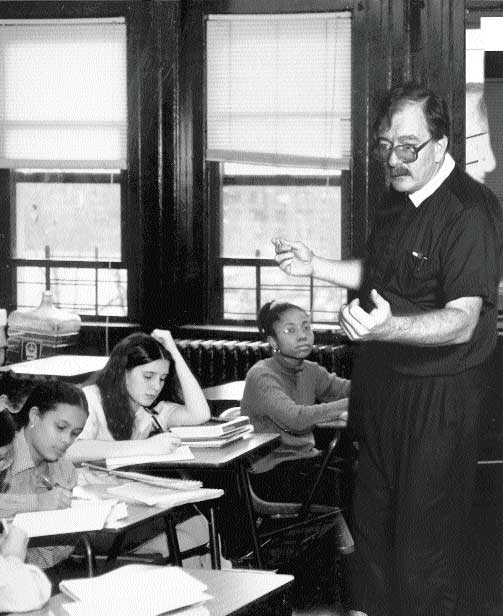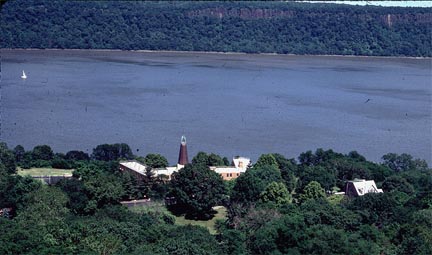Conference: "Resiliency in
Grace"
Speaker - Br. Brian Carty, FSC
 Br. Brian is founder of De La Salle Academy, 202 West 97-th
Street, New York, NY 10025. De La Salle's mission is to reach into less
advantaged communities and to offer academically talented students in grades six
to eight, a life-changing educational experience. The goal is to provide a
uniquely challenging curriculum in a nurturing and supportive environment where
each child is asked to be his or her best. For more information, call
212-316-5840 or visit www.DeLaSalleAcademy.com.
Br. Brian is founder of De La Salle Academy, 202 West 97-th
Street, New York, NY 10025. De La Salle's mission is to reach into less
advantaged communities and to offer academically talented students in grades six
to eight, a life-changing educational experience. The goal is to provide a
uniquely challenging curriculum in a nurturing and supportive environment where
each child is asked to be his or her best. For more information, call
212-316-5840 or visit www.DeLaSalleAcademy.com.
Outline of Talk
- Introductory Comments
- See his handouts about De LaSalle Academy.
- I was born and reared in the Bronx, in Ascension Parish. I had
my first Brother as a teacher in the fourth grade.
- I was bright in high school, but I noticed that other bright kids
weren't doing all that well. They had been the brightest kids in
their classes in grade school, where they had developed an auditory
learning style, as their teachers would repeat the lessons for the
slower kids. When they got to high school, they had to read.
Many of them were not able to read well.
- I became a school principal. I had two goals:
Get money, and
Revamp the
curriculum.
- The De La Salle Academy
- De La Salle Academy is on the top floor of a local parochial
school. We teach gifted but poor kids, of all races. A
diverse culture with different "messages". For them,
life is like a mine-field. We wanted an environment to help them
grow; so we set up a structured environment to help them negotiate the
mine-field, to get to the other side (i.e., achievement, growth).
- It's a positive, caring, protective, nurturing environment. Yet
some kids just didn't respond.
- A doctoral student came along and asked to be allowed to do an
ethnographic study of the school.
- One feature: she asked the faculty to categorize the students:
movers/shakers, fence-sitters, and nay-sayers.
- She then determined how the school's environment affected the kids
in each category.
- The result: the nay-sayers had no spiritual life; they did not
respond well and had poor relationships with adults; they preferred
to seek answers alone. Their attitude: life sucks and then you
die. For the movers/shakers, it was the opposite.
- She did a ten-year follow-up study. The nay-sayers said
that, despite their annoyance at the teachers' continual intervention,
those teachers had provided the grace that helped to
transform their lives.
- At De La Salle, the lockers allow for locks, but hardly anyone uses
locks. The kids trust the school and its students. With
trust, they can grow and become resilient, can bounce back. At the
school, they can have a joyful, free experience in being
themselves. Then, when they go home, they are better equipped to
handle their family environments.
- Can environments be arranged to provide transformative experiences to
kids? Yes.
- Parents try to get senses of what their kids' values are, of the
voices to which they are listening.
- No-dating Policy
- There is much pressure on kids to be sexually active, especially on
girls. It causes havoc in the community, especially when kids
break up and then resent each other.
- I established a no-dating policy at De La Salle. It provided
much relief, as the pressures, expectations and resentments vanished.
- However, some of the boys find it difficult, as they are taught to be
aggressive toward women. We try to teach them about the future,
about being faithful fathers. We lay it out as clearly as
possible.
- Resilience
- Humor is a resilience indicator
- We try to foster resilience in the face of extreme pressures from the
outside environments.
- Resilience can be taught. Kids can be taught to take risks, to
see the world in a different light, to develop realistic expectations.
- After Sept. 11, 2001, some of the boys said they didn't trust God
anymore. It turns out that none of them had a father at home.
- Our kids go into their next schools and almost immediately become
leaders. They are able to take moral stands and make
interventions. Not everyone heeds them, but they continue to
intervene. They become the grace-givers to their
peers. They are clear about where they stand. I'm quite
joyful about these results in our kids.
- People, not institutions, change the lives of other people. You
can intervene and make a difference.
- Questions & Answers
- What is the relation between "coping skills" and
resiliency? There are great pressures from a kid's peers. It
takes courage to stand alone among one's peers. We try to provide
a terra firma on which a kid can stand. Every kid should feel
safe.
- I look for kids who are bright pains-in-the-ass. Their
attitudes, after all, are appropriate given the environments from which
they come. My task is to reorient their energies and attitudes.
- We get 700 applications for 50 slots. We use the Otis-Lennon IQ test, a reading test, etc. We rank the kids and apply
various other criteria, then invite ~165 of them for interviews, after
which we pick the 50.
- We're fighting for the soul of a child.
- Organizations that observe us say that they envy our freedom (to
revise curriculum, school rules, etc.).
- Of the fence-sitters, some fall one way, some, the other. We
stress to them that, if they want to achieve their expressed goals,
they've got to lose certain attitudes, gain certain others, because
that's what those next schools want.
- We start each day in the classroom by saying, "We are in the holy
presence of God". We've added, "We are in the holy
presence of one another".
- Public school systems don't work; they are too bureaucratic.
Should encourage choice, to provide improvements and, hence, examples,
models.
- Our school has a critical mass; it's the right size for what we
do. We ask others to clone us, yet to take only those features
that will work for them.
- Teaching is a vocation, not a job. The instruction aspect of
teaching must be combined with the emotive, supportive aspects of
teaching.
- Breakout Session (Owen McKeon, leader) - See Br. Brian's handout
for the breakout: "Grace and Resilience".
- Segundo Fernandez: I went to a De La Salle school in Havana. It
changed my life.
- Phil Pergolizzi: The facilitator in the support group after my wife
died. She would say to me, "Don't give up the ship".
- D. Vawter: My father, sho held the family together, while my wife was
ill.
- Rich Sharood: My aunt reared my mother and put her through college,
all on a seamstress's earnings.
- Bill DeSantis: My parents, who inspired us kids.
- Dave Price: A couple of friends, who helped me make key career
decisions. I did not realize at the time how significant they
were.
- Sal Pizzurro: My wife gave me values later in life, after a childhood
in which my uncle was involved in crime.
- Owen McKeon: As a high school freshman, my teacher, Br. Paul. He
gave me a sense of what it meant to be a brother.
- Video for De La Salle
- Kevin Dolan: I'm giving a copy of a video to Br. Carty. It's
about the transformation of the Ironbound section of Newark, NJ after
the 1967 riots (20 years later).
- I'm forming a steering committee to help Br. Carty produce an
analogous video for his school, to create interest in forming another
school and as a fund raiser.
- The steering committee will consist of myself, Dave Price, and 4-5
others.
- There are advertising agencies with little to do right now. They
normally do 20% of their work for non-profit causes.
- Goal: Produce the inspiring school video by next year for showing at
next year's retreat.
(The notes of this outline were taken by David
G. Price. They were wordprocessed by Patrick Lyons.
These notes may not be reproduced without the written permission of the
presenter.
This page was last edited on September 12, 2003 by Patrick Lyons.)


 Br. Brian is founder of De La Salle Academy, 202 West 97-th
Street, New York, NY 10025. De La Salle's mission is to reach into less
advantaged communities and to offer academically talented students in grades six
to eight, a life-changing educational experience. The goal is to provide a
uniquely challenging curriculum in a nurturing and supportive environment where
each child is asked to be his or her best. For more information, call
212-316-5840 or visit
Br. Brian is founder of De La Salle Academy, 202 West 97-th
Street, New York, NY 10025. De La Salle's mission is to reach into less
advantaged communities and to offer academically talented students in grades six
to eight, a life-changing educational experience. The goal is to provide a
uniquely challenging curriculum in a nurturing and supportive environment where
each child is asked to be his or her best. For more information, call
212-316-5840 or visit